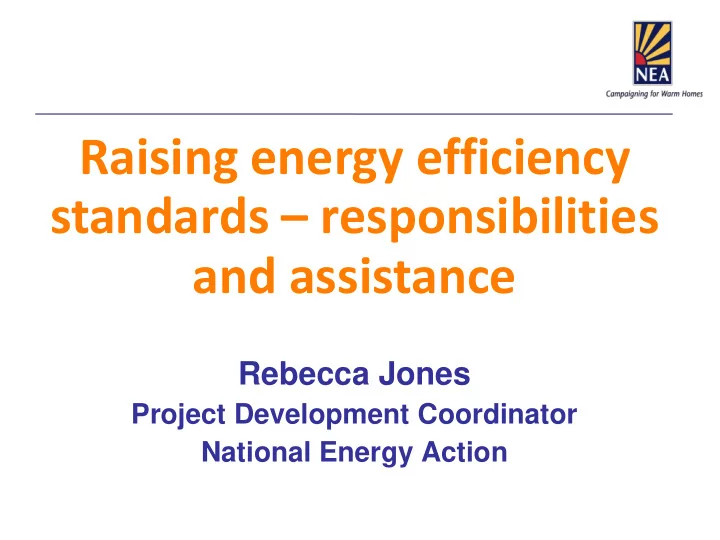

Raising energy efficiency standards – responsibilities and assistance Rebecca Jones Project Development Coordinator National Energy Action
Overview NEA – who we are Fuel poverty – causes and effects Increasing energy efficiency Current legislation – HHSRS Assistance Legislative changes Questions and discussion Feed-back and further information
National Energy Action – who we are National fuel poverty charity Established 1981 Supporting households in fuel poverty Supporting organisations that work with fuel poor households Campaigning and working with government Working with businesses and utility companies Research and demonstration projects www.nea.org.uk
Fuel poverty in the private rented sector - Causes Definition of fuel poverty “The inability to afford to heat the home adequately”. Households that need to spend more than 10% of their income on fuel Children, young people, chronically sick, disabled, older people and low income groups are most at risk Private rented sector specific causes ‘Hard to treat’ properties Investment rationale is driven by the market and regulations as opposed to investment in own home Low income / vulnerable households Transient populations Exacerbated by: Rising fuel prices Recession and overall inflation Colder winters
Fuel poverty in the private rented sector - Effects Potential issues for the landlord Deterioration of the property Increased maintenance and repair costs Reduction in the asset value of the property Fuel arrears Rent arrears Reduction in re-let potential Impact on tenant Cold, damp home Condensation and mould Difficulties paying fuel bills Health problems worsened
Increasing energy efficiency in the private rented sector – prioritisation Roof Savings: £50 - £180 25% Walls 35% 10% Windows Savings: Savings: £130 - £160 Up to £165 15% Draughts Savings: £20 15% Floor Savings: £20 - £70
Increasing energy efficiency in the private rented sector – measures Insulation Loft Cavity wall Solid wall Highly recommended where there is electric / oil heating Heating Consider new efficient system where old / partial system or frequent callouts for repairs Heating controls Ventilation Extractor fans Trickle vents in windows Advice to tenants
Increasing energy efficiency in the private rented sector – tenants Role of tenants Efficient use of heating and hot water systems Lifestyle factors that decrease potential condensation All inclusive rents could result in high landlord fuel bills; these can be reduced through energy efficiency measures Advice pack for tenants Heating control instructions Energy advice leaflet Advice on minimising condensation Instructions on engaging with energy companies: Sources of advice - Home Heat Helpline, CAB, Debt advice agencies
Current legislation - HHSRS Housing Act 2004 Risk assessment tool to identify hazards For use by local authorities in private rented, owner occupied and registered social landlord housing sectors Principle: Any residential property should provide a safe and healthy environment for any potential occupier or visitor Assessment: Scoring number & degree of hazards Banded as category 1 or 2 hazards Excess cold Excess heat Damp and Pollutants mould growth Space (lack of) Security Lighting Noise Hygiene / Accidents (falls, Structural sanitation fires etc) collapse
HHSRS – local authority role Scoring based on risk to most vulnerable potential occupant Statutory duty to enforce where category 1 hazards are identified Enabled to address category 2 hazards Formal and informal approaches to enforcement Production of schedule of remedial works N.B. No heating/inadequate/unaffordable heating can be assessed as a CAT 1 Excess Cold hazard
Assistance • Energy Company Obligation (ECO) • Warm Home Discount Scheme • Fuel suppliers’ grants and hardship funds • Cold Weather Payment • Winter Fuel Payment • Priority Service Register • Local authority
Legislative changes Mandatory minimum standards April 2016 = “Reasonable” requests for energy efficiency improvement. April 2018 = illegal to rent out F & G rated properties UNLESS landlord has carried out maximum package of measures under Green Deal/ECO.
Useful contact numbers Home Heat Helpline 0800 33 66 99 Citizens Advice Consumer Service 08454 04 05 06 Energy Saving Advice Service Impartial ECO and other energy saving advice 0300 123 1234
NEA London & South East contacts Danni Crosland – Project Development Manager (based in London) Danni.Crosland@nea.org.uk 0207 250 8304 / 07711 593065 Rebecca Jones – Project Development Coordinator Rebecca.jones@nea.org.uk 01273 964 229/ 07738 417 448 Thank you – Any Questions??
Recommend
More recommend